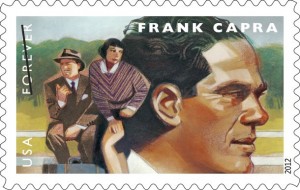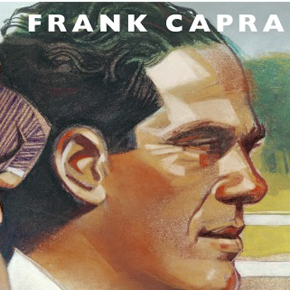Sicilian-born filmmaker’s movies focused on patriotism and hope
A stamp to honor film director Frank Capra, best known for the perennial favorite It’s a Wonderful Life starring James Stewart, has been issued by the Postal Service. Capra is one of four famous filmmakers to be awarded their own stamps. The others are John Ford, John Huston and Billy Wilder. The stamps will feature images from their most famous movies.
“With these stamps, we’re bringing these filmmakers out from behind their cameras and putting them in the spotlight so that we can learn more about them,” said Samuel Pulcrano, U.S. Postal Service vice president of corporate communications.
Capra’s movies, which along with It’s a Wonderful Life (1946) also include It Happened One Night
(1934), You Can’t Take it With You
(1938), and Mr. Smith Goes to Washington (1939), reflect an America ready for social change but still strongly attached to traditional family and class values.
One common theme running through his films is the presence of patriotism and hope, which Capra sees as an antidote to a hard life. “I see a small farm boy becoming a great soldier; I see thousands of marching men…And I can see the beginnings of a new nation like Abraham Lincoln said. And I can see that Ohio boy being inaugurated as president. Things like that can only happen in a country like America,” says the hero of Mr. Deeds Goes to Town (1936).
Born Francesco Rosario Capra in 1897 in Bisacquino, near Palermo, Sicily, he was six years old when he emigrated with his family to the United States. He once recounted the ship’s arrival into New York, where he saw “a statue of a great lady, taller than a church steeple, holding a torch above the land we were about to enter.”
His father said to him, according to a 1992 biography of Capra, “Ciccio, look! Look at that. That’s the greatest light since the star of Bethlehem! That’s the light of freedom. Remember that. Freedom.”
Capra’s family moved to an Italian section of Los Angeles, where the young Capra sold newspapers to help support his family. He worked odd jobs and played the banjo to pay his way through college, eventually earning a chemical engineering degree from California Institute of Technology.
He enlisted in the Army during World War I and after the war went into the entertainment business, starting out in comedy and eventually turning to film-making in the early 1930s.
At the height of his career, Capra again enlisted in the Army during World War II and directed war films for the government. He earned an Academy Award for one and a Distinguished Service Medal.
 Capra’s films earned many Academy Awards but It Happened One Night, a comedy starring Claudette Colbert and Clark Gable that captured the country’s need to escape the realities of the Depression, became the first movie to win all five top Oscars including Best Picture.
Capra’s films earned many Academy Awards but It Happened One Night, a comedy starring Claudette Colbert and Clark Gable that captured the country’s need to escape the realities of the Depression, became the first movie to win all five top Oscars including Best Picture.
Capra was also active in the film industry, working with the Screenwriters Guild and serving as president of the Academy of Motion Pictures.
Capra died of a heart attack in California in 1991 at age 94. His son Frank Capra was also in the film business until his death in 2007. A grandson Frank Capra III is a Hollywood director whose work includes the 1995 film The American President.
Capra’s films are considered timeless fables that glorify the average individual, decry materialism and offer optimism for the future.
Reprinted from Voce Italiana, Aug-Sept, 2012

